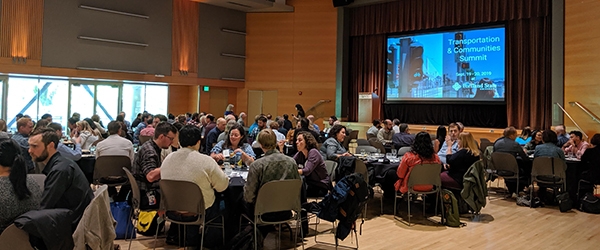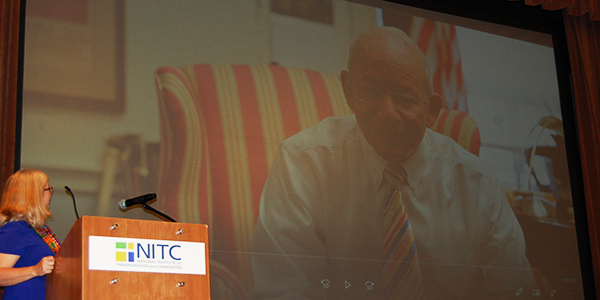Transportation and Communities Summit 2019: Prioritizing Housing, Multimodal Data, and Access to Active Mobility

The 11th annual Transportation and Communities Summit 2019, held at Portland State University (PSU) on September 19–20, drew attendees from 14 states across the U.S. Over 250 people joined us for the Summit day, and nearly 60 took part in the deep-dive workshop day. We hope the event offered new opportunities for collaboration and synergy between researchers, practitioners, and community members.
Peter DeFazio, the U.S. Representative for Oregon's 4th congressional district, kicked off the day with a video welcome message for the summit attendees, followed on the main stage by TREC director and urban planning faculty Jennifer Dill.
At lunchtime Ben Wellington, the data storyteller behind the popular quantitative analysis blog IQuantNY, delivered the keynote address, "Shaping a City with Open Data." His driving message was the priority that agencies need to place on open data access, and how anyone can start to explore the story behind that data with some simple math. If you missed his keynote, you can watch his TedTalk here. His advice on data storytelling:
- Connect with people’s experiences.
- Focus on a single idea.
- Keep it simple.
- Explore the things you know best.
- Figure out exactly what you are going to say.
- Think outside the box, even what data sources you’re pulling from!
Over the course of two days, we offered nine breakout sessions and five hands-on workshops, giving attendees an in-depth look at topics in three main tracks: multimodal data, mobility in active transportation, and the intersection of transportation and affordable housing. All of the available TCS presentations can be found online here.
This year we also featured four alternative sessions to mix up the day:
- "Lightning Talks" offered a quick overview of a topic, with each speaker having to zip through 20 slides at 20 seconds per slide.
- A panel of local communication experts offered insights on character-rich storytelling driven by data.
- A transportation equity consultant held a short workshop on how to talk about equity.
- Twenty university students from NITC partner campuses presented their research in a student poster competition.
At the closing reception, TREC director Jennifer Dill awarded cash prizes to the winners of the student poster contest. Thank you to Student Poster sponsors Ride Report and Jacobs Engineering for supporting this program:
- MOST INNOVATIVE: Farah Naz of the University of Texas at Arlington took home a new prize offered for the first time this year for her poster "A Comparative Analysis Of Paratransit and On-demand Ridesharing: Riders and Their Travel Pattern."
- FIRST PLACE: Awarded to Sabina Roan of Portland State University for the poster "Ready Streets: Human Powered Mobility in the Post-earthquake Recovery Period." Other student authors included Kerry Aszklar, Jaye Cromwell, Bryan Nguyen, Joey Posada, and Sophie Turnbull-Appell of PSU's School of Urban and Regional Planning.
- SECOND PLACE: Kate Wihtol, a graduate of PSU's Master of Urban and Regional Planning program, presented "Living Streets: A Pathway Toward Inclusive, Equitable, and Accessible Pedestrian Streets."
- THIRD PLACE: Gabriella Abou-Zeid created the poster "Walkability in Tucson, AZ." as part of her capstone work at the University of Arizona.
This event was sponsored by the National Institute for Transportation and Communities (NITC), a national university transportation center housed at PSU and managed by the Transportation Research and Education Center (TREC). NITC is a six-university consortium–in addition to PSU, partners include the Oregon Institute of Technology, University of Arizona, University of Oregon, University of Texas at Arlington and University of Utah—and is one of seven U.S. Department of Transportation national university transportation centers. Check out the NITC researcher directory here.
CONTINUING EDUCATION CREDITS
All continuing education credits are self-reported by the attendee. All breakout sessions, the keynote, and workshops have been pre-approved for AICP credits, and if you're reporting AICP you must have signed in at the door to the session. There is no pre-approval process for PDH, and signing in is not required. If you need a certificate of attendance for any CEU's, contact us at asktrec@pdx.edu.
The National Institute for Transportation and Communities (NITC) is one of seven U.S. Department of Transportation national university transportation centers. NITC is a program of the Transportation Research and Education Center (TREC) at Portland State University. This PSU-led research partnership also includes the Oregon Institute of Technology, University of Arizona, University of Oregon, University of Texas at Arlington and University of Utah. We pursue our theme — improving mobility of people and goods to build strong communities — through research, education and technology transfer.





